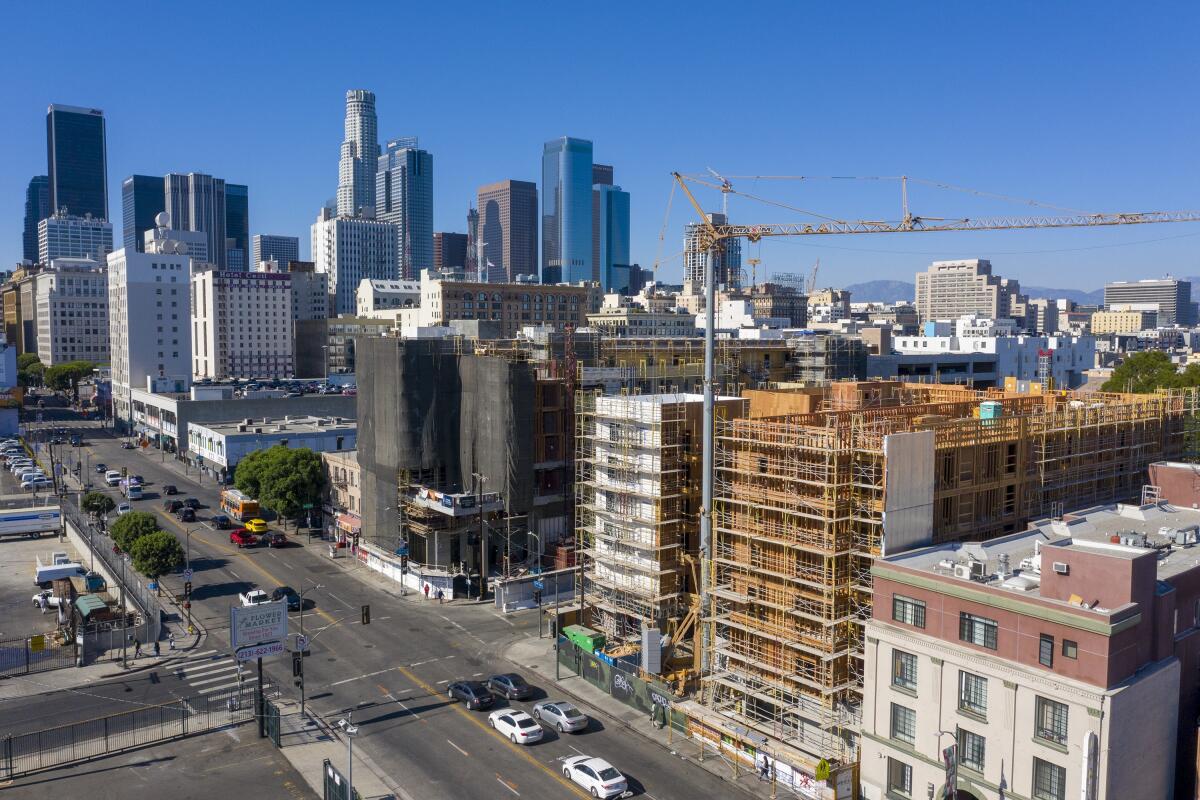Editorial: L.A. needs to build housing quickly. So why is the City Council sitting on plans to expedite construction?

- Share via
To ease Los Angeles’ crushing housing shortage, the city needs a lot more new homes, especially affordable ones. Yet the City Council has been sitting on two community plans that would make it easier for developers to construct housing and boost the number of low-income units in downtown and Hollywood.
What’s the holdup? Politics and scandal.
Last fall, just as the council was about to begin debating the Downtown Community Plan, a leaked audio recording revealed three council members making racist and demeaning comments about their colleagues and constituents. Two of the council members involved — Kevin de León and Gil Cedillo, who has since been replaced on the council — had helped shape the plan because their districts include parts of downtown.
On development matters, the City Council generally defers to the council member who represents the area. And with the two men going into hiding after the scandal, the council’s Planning and Land-Use Committee put the plan on hold.
Los Angeles City Hall’s dysfunctional relationship with real estate development has contributed to so many of the city’s ills.
The political culture around development is already problematic. Council members treat their districts like fiefdoms in which they have complete control over land-use decisions. But that deference is now slowing the city’s much-needed effort to modernize its land-use rules and plan for 455,000 new homes, including 185,000 affordable units by 2029 to meet state requirements.
As the months ticked by, civic leaders have become increasingly concerned by the delays. The Downtown Community Plan — also known as DTLA 2040 because it would set the vision for the next 20 years of development — is an integral piece of the city’s strategy to solve the housing crisis. The downtown area represents just 1% of the city’s land, but planners expect it will add 100,000 new homes — or 20% of the city’s housing growth — over the next two decades.
Community plans set the goals and rules for development in a neighborhood, including where new homes, jobs and other development projects can be built. In a city where land-use decisions can be epic battles, there is broad support for DTLA 2040, which was approved by the Planning Commission in September.
Business groups like that the plan provides clear rules for developers. It does away with some of the case-by-case negotiations between the developer and council members that can breed corruption — as seen in the indictment of former downtown Councilmember Jose Huizar — and allows for quicker approvals. It can take years to permit a mixed-income apartment building under current rules; under the proposed plan, such a development could get approved in months.
Affordable-housing advocates and community groups like that the plan supports neighborhood-serving businesses like grocery stores and health clinics. It also allows developers to build bigger projects in exchange for reserving some units for “acutely low-income” residents who have an income of less than $10,000 a year. The category can include seniors and people living on Social Security payments who may be too poor to qualify for other subsidized housing.
Los Angeles has created an ambitious plan to build more housing, especially affordable housing, throughout the city.
There is still some necessary debate over details. Garment factory workers are concerned new development pressure will push manufacturing out of the Fashion District. Business groups take issue with a provision that allows only affordable housing on skid row. And Chinatown property owners worry the restrictive zoning in their area would squelch investment and new construction. But there can be no discussion or compromise until council members take up the plan.
The Hollywood Community Plan has been on hold for even longer; it’s been awaiting council consideration for more than 500 days. The Hollywood plan would also create clear rules on when developers would be required to include affordable units in exchange for building bigger — again, limiting the political negotiations that too often stymie production of market-rate and affordable housing.
If the City Council doesn’t act on the Downtown and Hollywood plans by May, the documents will expire and the Planning Department will have to restart the approval process, which could delay the plans by as much as a year. And, because the Downtown and Hollywood plans have dragged on for so many years, the Planning Department hasn’t been able to accelerate work on the next round of community plans.
L.A. leaders should be rushing to accommodate more housing production. The community plans are too important to stall.
More to Read
A cure for the common opinion
Get thought-provoking perspectives with our weekly newsletter.
You may occasionally receive promotional content from the Los Angeles Times.












